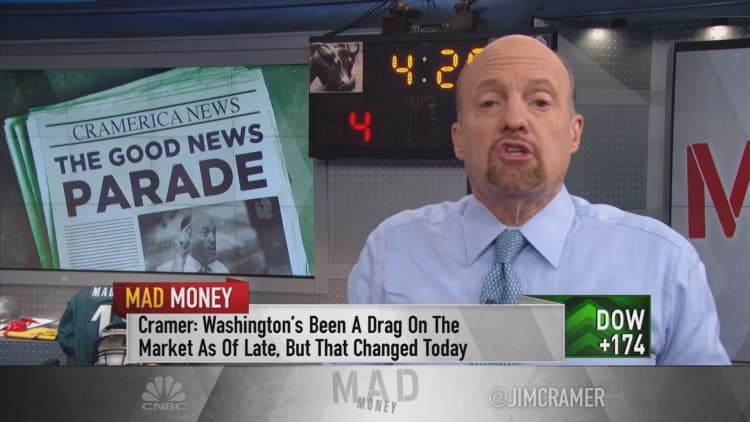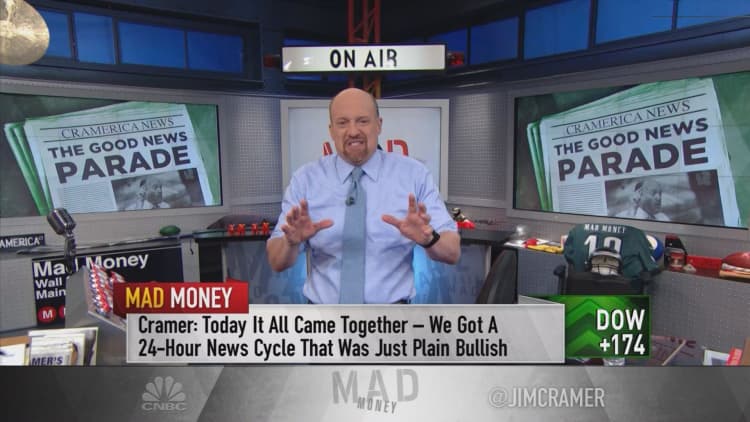
Thursday's market surge intrigued Jim Cramer, so he decided to look at the day's earnings reports to find where all the bullishness originated.
"There are a couple of joyous weeks every quarter where we hear from individual companies that their collective results are actually able to control the agenda of trading," the "Mad Money" host said. "They serve as the preponderance of the evidence about how companies are really doing, how their stocks should perform, and, by extrapolation, how strong or weak the broader economy may be."
In other words, major institutions like the Federal Reserve or the Department of Labor typically hold sway over the market. But during earnings season, a flurry of strong reports can coax a positive response out of the market on its own.
Watch the full segment here:

Cramer admitted that the macro setup was favorable, with interest rates on the rise, strength in European markets, and a bullish rhetoric on tax reform from Treasury Secretary Steven Mnuchin.
But the real strength started with American Express' earnings report after Wednesday's market close. The company handily beat estimates and boasted exceedingly healthy growth worldwide.
"Buried within the AmEx conference call was an amazing statistic: 60 percent of the new leads for cards are coming from digital, which to me was a clarion call to buy the stocks of Google's parent Alphabet and Facebook, the natural winners when ads are placed on the web," Cramer said.
Following that were two excellent and mutually-supportive reports from CSX and Nucor that showed increases in steel production and use, a bullish sign for the industrial sector.
Europe's resilience was verified by reports from packaged goods giants Unilever and Nestle, which exceeded analysts' growth estimates and pointed to improvement in global sales, especially in Latin America.
Lower bond prices and higher yields gave Keycorp's earnings report a boost. The bank showed signs of its merger with First Niagara starting to pay off and saw strong growth, cost controls, and a lift in its net interest income.
"Key's nearly 5 percent rally — it's a bank stock — and the weakness in bonds caused people to circle back to the financials. It also served as a reminder, by the way, that Goldman Sachs' poor quarter was truly an outlier when compared to the regionals, the brokers, or the internationals. I say the group's not done going higher," Cramer said.
Two positive research notes on Apple rounded out the day's successes, with Morgan Stanley setting expectations for a healthy quarter thanks to the new iPhone super-cycle.
"While you know I hate that term — it sets up [Apple CEO] Tim Cook for failure, don't want that — I understand the sentiment," Cramer said. "So did Wall Street. Apple's stock soared."
And although some laggards did come out of the woodwork, with Verizon seeing fewer-than-anticipated sign-ups and Ebay's growth slacking more than it should have been, the market's overall layout is undeniably improving, Cramer insisted.
"Today was a day for guys like me, guys like me who like to put together the mosaic from individual companies and reach our own conclusions. Those conclusions were almost uniformly bullish. And that, not oil, not bonds, not Trump, gave you this beautiful one-day rally," the "Mad Money" host said.
Questions for Cramer?
Call Cramer: 1-800-743-CNBC
Want to take a deep dive into Cramer's world? Hit him up!
Mad Money Twitter - Jim Cramer Twitter - Facebook - Instagram - Vine
Questions, comments, suggestions for the "Mad Money" website? madcap@cnbc.com



